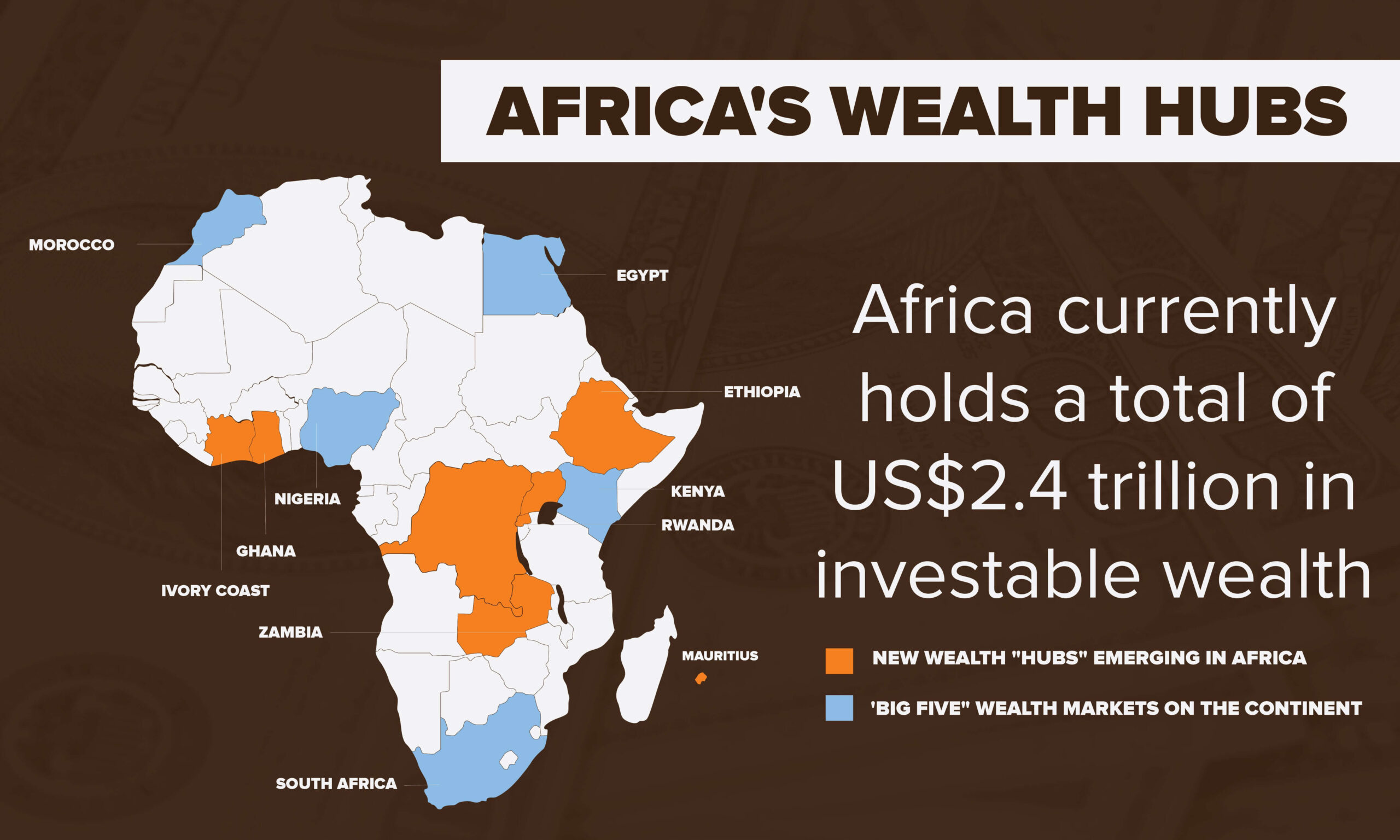Smaller African nations are giving rise to a new generation of millionaires, challenging the ‘big five” wealth markets on the continent – South Africa, Egypt, Nigeria, Kenya, and Morocco – some of which have experienced millionaire “flight” over the past decade.
The growth of high-net-worth individuals in traditional powerhouse economies like South Africa, Egypt, and Nigeria is cooling off, according to the latest Africa Wealth Report published by Henley & Partners and New World Wealth.
In contrast, emerging markets such as Rwanda, Cote d’Ivoire, and Zambia are experiencing a surge in their millionaire populations, indicating a shift in wealth generation across the continent.
Well, this comes as overall numbers of wealthy individuals dipped in the last ten years.
“Total high-net-worth individual numbers in Africa have fallen by 12% over the past decade (2012 to 2022),” reads the report in part.
“Rwanda was the top performing market in Africa during the period, with millionaire growth of 72%, followed by Mauritius, Ethiopia and Ghana, whose millionaire populations had been growing rapidly until 2019, have struggled over the past few years, which has pulled back their 10-year growth rates.”
This wealth distribution shift highlights these emerging economies’ potential to reshape Africa’s financial landscape, though the top five economies still control the bulk of the wealth.
“The ‘Big 5’ wealth markets in Africa — South Africa, Egypt, Nigeria, Kenya, and Morocco — together account for 56% of Africa’s high-net-worth individuals and over 90% of the continent’s billionaires.”
South Africa leads the ranking of the top 10 most affluent African nations in terms of resident high-net-worth individuals, significantly outpacing its competitors.
According to the report, the Rainbow Nation was home to 37 800 US dollar millionaires, of a continental total of 138,000, at the end of 2022.
It also boasts four of Africa’s wealthiest cities, with Johannesburg topping the list, home to 14,600 millionaires.
“South Africa’s high centi-millionaire count is particularly notable. Centi-millionaires are typically the founders of large multi-national companies, making their presence in a country particularly valuable when it comes to creating employment,” the Wealth Report says.
Cairo is second, followed by Cape Town with 7,400 and 7,200 resident HNWIs, respectively.
Lagos and Nairobi take the fourth and fifth positions, while Durban and Pretoria secure the sixth and eighth spots, with 3,600 and 2,400 millionaires, respectively.
Mauritius’ impressive rankings are particularly striking, considering its modest geographical expanse and population size.
Africa’s millionaire population is expected to grow by 42%, reaching 195,000 by 2032. Mauritius leads the pack with a forecast 75% growth rate.
Meanwhile, countries like Namibia, Rwanda, Zambia, Seychelles, the Democratic Republic of the Congo, and Morocco are expected to see high-net-worth individual growth exceeding 60%.
Despite this growth, approximately 18,500 HNWIs left Africa between 2012 and 2022, most relocating to the UK, the USA, and the UAE. Others have moved to Australia, Canada, France, Israel, Monaco, New Zealand, Portugal, and Switzerland.
Within Africa, most HNWIs have relocated to Mauritius and South Africa.
However, many African-born billionaires have left the continent in the past 20 years. With only 23 of the 52 African-born billionaires still residing in Africa, Henley & Partners assert this poses a significant challenge as these entrepreneurs can potentially create substantial employment in their host countries.
“They usually relocate to expand their businesses or due to safety concerns,” the firm said.
Africa currently holds a total of US$2.4 trillion in investable wealth.
Of the 138,000 millionaires residing on the continent, each with a net worth of US$1 million or more, there were 328 individuals classified as centi-millionaires, having a net worth of US$100 million or more, and a further 23 billionaires, each possessing a net worth of US$1 billion or more.
Wealth managers and private banks hold around US$150 billion of Africa’s high-net-worth individuals’ wealth.
Generally, wealth managers in Africa serve clients with investable assets over US$500,000, providing services such as asset management, financial planning, and inheritance planning, which remain in high demand.
Johannesburg in South Africa is the top wealth management hub in Africa. The African wealth management market is set to expand by an impressive 60% over the next decade, the report said.
bird story agency
Smaller African nations are seeing a rise in new millionaires, shifting the wealth distribution previously dominated by South Africa, Egypt, Nigeria, Kenya, and Morocco. Emerging markets like Rwanda, Cote d'Ivoire, and Zambia are increasing their populations of high-net-worth individuals despite an overall 12% decline in wealthy Africans between 2012 and 2022.
Rwanda witnessed the highest growth at 72%, with Mauritius, Ethiopia, and Ghana also showing significant increases until recent years. The majority of Africa's wealth remains concentrated in the top five economies, with South Africa leading, holding over 37,800 US dollar millionaires and four of the continent's wealthiest cities.
Africa's millionaire population is anticipated to grow by 42%, reaching 195,000 by 2032, led by Mauritius' expected 75% growth rate. Other countries like Namibia, Rwanda, and Zambia are also forecasted for significant millionaire increases. However, Africa faces a challenge with the exodus of 18,500 high-net-worth individuals relocating primarily to the UK, USA, and UAE over the last decade.
Currently, Africa holds $2.4 trillion in investable wealth, with 138,000 millionaires, including 328 centi-millionaires and 23 billionaires. Wealth managers and private banks control around $150 billion of this wealth. Johannesburg is the top wealth management hub, and the sector is expected to expand by 60% in the next decade.






